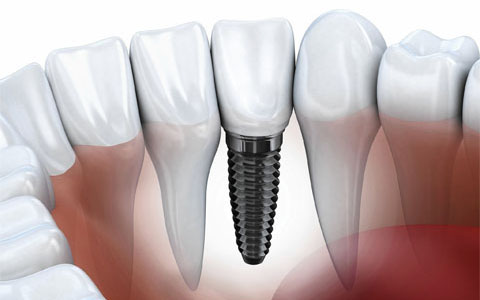 Dental implants are truly a revolution, solving any missing teeth problem safely and predictably. Dental implants can replace a single tooth, several teeth or complete dentures.
Dental implants are truly a revolution, solving any missing teeth problem safely and predictably. Dental implants can replace a single tooth, several teeth or complete dentures.
What are some of the benefits of dental implants?
Dental implants are an effective, safe and predictable solution to the problems resulting from missing teeth. Many patients report exciting benefits from dental implants, such as:
- “New teeth” that look, feel and function like natural teeth
- Improved esthetic appearance
- The ability to chew without pain or gum irritation
- Improved quality of life
- Reduction or elimination of bone atrophy or shrinkage, commonly associated with loss of teeth.
Master Dental Care offers advanced specialized knowledge about the clinical applications of dental implantology. We assure our patients the highest level of surgical and prosthetic expertise and state-of-the-art procedures, resulting in successful integration of your new dental implants and a highly esthetic result. A thorough preliminary dental and radiographic examination from a trained implant specialist is paramount to a successful experience with your implants.
Why should I consider dental implants?
If you, like millions of people, have lost one or more teeth, you may be already familiar with the unpleasant consequences. For many, missing teeth lead to an unattractive smile, embarrassment from loose dentures, and difficulty with eating. Traditional dentistry can provide replacements for missing teeth using bridges, removable partials and dentures. However, each of these has its problems. Bridgework usually involves altering natural teeth to provide a stable foundation for support of replacement teeth. Partials and dentures can be very unstable and may lead to sore spots or speech difficulties. Another little-known problem associated with tooth loss is a process known as “bone atrophy,” a shrinking of the jawbone that can progress relentlessly over the years. Bone atrophy not only affects jaw function but can cause adverse facial cosmetic changes. Dental implants offer an effective solution to many of these problems.
What is a dental implant?
A dental implant is a prosthetic replacement for a missing tooth. There are commonly three parts to what is described as an implant – the implant device itself (which is inserted directly into the bone), the abutment – the piece that connects the implant device to the third part – the overlying crown or denture. Today’s implants are predominantly made of titanium, a metal that is bio-compatible and offers strength and durability as well as a unique property of fusing directly to bone – the process known as osseointegration. Other materials, such as zirconium, might be used to make implants in the future. But for now, these materials have not been perfected for general use.
How are dental implants placed?
Dental implants are generally placed in two phases.
Phase 1 – the actual implant placement, a process performed in the office with local anesthesia. Using precise, gentle surgical techniques, the implants are placed into the jawbone for 6 weeks to 6 months while osseointegration (bonding to bone) takes place, depending on the quality of bone and need for bone grafting. This helps ensure a strong, solid foundation for replacement teeth. During this time, temporary bridges or dentures may be used to minimize any cosmetic or chewing inconvenience.
Phase 2 – involves creating and attaching the new tooth or teeth to the anchored implants(s) in your jaw.
Under certain circumstances, phases 1 and 2 can be performed simultaneously, thus eliminating treatment time and delivering teeth the same day as the day of implant
